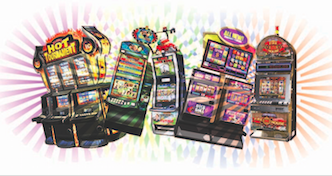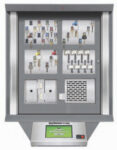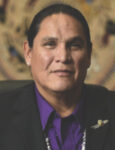
Even before the model compact for Oklahoma Indian tribes was drawn up in 2005, the state had a robust Class II gaming industry. As the compacts were being negotiated, there were already 30,000 slot machines in the state-at least 90 percent of them Class II games.
Today, there are well more than 50,000 machines in Oklahoma, but now, more than two-thirds of them are Class III traditional slot machines.
Right from the start, Oklahoma customers were more sophisticated than the normal new jurisdiction. They had experience in Missouri, Louisiana and even Las Vegas, so a boring bingo machine wasn’t going to cut it. To solve that problem, several small companies stepped up to the plate to develop new games. The only catch was that the federal government, via the National Indian Gaming Commission, kept threatening to draw a “bright line” between Class II and Class III machines that might have, at any time, short-circuited this remarkable technology revolution.
Chris Korpi, vice president of sales for slot manufacturer and longtime Oklahoma supplier Cadillac Jack, says boring games were never the norm in Oklahoma.
“Tribes in Oklahoma have always been interested in the newest technology” he says, “and as the market has matured and many tribes are now operating full-scale casino resorts, we have enhanced our game development to remain ahead of the competition using free-spin bonuses, in-house progressives, and variable volatilities in our video reel product.”
Another company with deep roots in Oklahoma is Austin, Texas-based Multimedia Games, which introduced the first linked progressive to the state in 1995, MegaMania. Mick Roemer, the company’s vice president of sales and marketing, says a second progressive game, MegaNanza, used the more traditional spinning reels to give it a real slot machine feel, but with the bingo technology.
“The ‘bonanza’ (pre-drawn) aspect of that game was challenged by the NIGC in 2002, so Multimedia Games and its tribal customers converted those deployed machines to Reel Time Bingo, a ‘standard-sequence’ game that featured the results in an entertaining, spinning-reels manner. Standard sequence simply refers to the fact that all cards are sold before the bingo numbers are drawn,” said Roemer.
Jim Nulph, marketing director at Tulsa-based VGT, says innovations were the key behind the success of the smaller slot companies in Oklahoma.
“Our company’s founder and CEO, Jon Yarbrough, had the vision to recognize the importance of investing in improvements to bingo,” he says. “First, it simply presented a good business opportunity. Secondly, Jon realized that a strong-performing bingo game is vital to the independence and sovereignty of Native American tribes. As a result of VGT’s vision and leadership, we were able to develop long-lasting partnerships with Oklahoma tribal leaders. These partnerships played an important role in bringing highly profitable bingo games to the Oklahoma market. VGT games have generated close to $4 billion in Oklahoma tribal profit, more than the games of any other manufacturer.”
It’s this insistence on sovereignty that drives the business of Cadillac Jack, according to Korpi.
“We consider Class II products as tribal sovereignty enforcement devices,” he says. “The placement and use of Class II is vital to the sovereignty of tribal nations, and we are honored to have been a significant contributor to the success of Indian gaming in Oklahoma. Revenue from Class II devices remains entirely with the tribe, without any revenue sharing with other governments. It is Cadillac Jack’s goal to continue to be a part of tribal economic self-sufficiency.”
Nulph says the issue has always been important to his company.
“At a recent tribal conference,” he explains, “tribal leaders equated a strong Class II business to the preservation of sovereignty. Disruptions and unclear definitions threaten the foundation of what is clearly a tribal right, and from a business perspective, make it inefficient for all Class II business interests. So, while the work that has been done to protect Class II bingo games has been a great effort by us all, we know that the rewards are worth it and we can’t let our efforts wane.”
But there was always the threat that the NIGC could end the experiment, if rigid rules and regulations were put into place.
“In the last decade the NIGC tried to promulgate new game classification standards that would make games such as Reel Time Bingo less marketable,” says Roemer. “Beginning in 2008, MGAM joined with other Class II gaming manufacturers, including Rocket Gaming, Bally, IGT, VGT, AGS, Nova Gaming and Planet Bingo, in a working group alongside tribes from across the country and two NIGC committees to fight the NIGC’s proposed restrictions. In the end, the NIGC pulled back its classification standards proposal and its attempt to redefine ‘facsimile’ (for Johnson Act purposes) and instead published Class II technical standards and Class II minimum internal control standards.”
Korpi says Cadillac Jack was able to minimize this disruption by working closely with the tribal gaming regulators and other manufacturers within the industry.
“Since the tribal gaming regulators are the only entity that can define what is or what isn’t a Class II device, we looked to these regulators to guide us as to how our Class II devices should operate,” he says. “As part of a concerted and cooperative effort with the tribes and other manufacturers, Cadillac Jack was able to help defend tribes against efforts by the NIGC to erode tribal sovereignty.”
For manufacturers, the ability to help grow the gaming market in Oklahoma was more gratifying than simple profits for their companies.
“The stronger our games perform, the more that the casino, and ultimately the tribe, earns, which results in better lives for the members of the tribes with which we do business,” says Korpi.
Roemer says Multimedia has been a true partner to the state tribes.
“Multimedia Games was the first company to support Oklahoma tribes by financing the construction of new gaming facilities,” he says. “The original Chickasaw WinStar Casino in Thackerville, Riverwind near Norman, the two Osage Million Dollar Elm casinos near Tulsa and the Peoria tribe’s Buffalo Run Casino in Miami were among development projects where Multimedia provided financing and project support. Other gaming companies have since joined with that type of financing support to tribes. Multimedia Games remains a major financing partner with the Chickasaw Nation, Oklahoma’s largest gaming tribe.”
VGT has also partnered with tribes.
“It is an honor to be part of an industry that does so much good for its communities and employees,” says Nulph. “The transformation of our partner tribes and the communities in which our games are placed has been just phenomenal. It is rewarding to know that almost $4 billion in tribal profit has come from VGT machines alone. It is difficult to say how many students have been educated, how many sick have been cared for, and how much Native American culture has been preserved from this tribal partnership. The word gratifying does not begin to capture how good this all makes company associates feel about their contributions.”
While the entry of the main Class III slot manufacturers into Oklahoma has created more diversity in the market, the original Class II providers still achieve a major level of sales in the state. The tribes recall the suppliers’ commitment to them when others were reluctant to make the technology adjustments necessary to compete in the market. And as a result, companies like Multimedia, VGT and Cadillac Jack have become major players in the Class III gaming markets beyond Oklahoma.


















